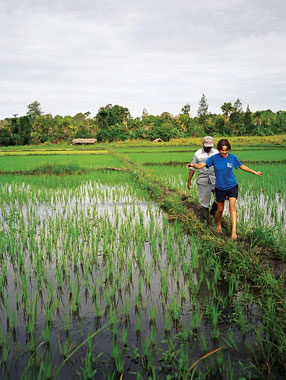| 2003/04
Annual Report THE UNIVERSITY OF BRITISH COLUMBIA |
As co-president of the UBC chapter of Engineers Without Borders, Monica Rucki went to East Timor in 2003 to develop a gravity fed irrigation system for rice farmers. Once there, she also helped build solar dryers to help villagers preserve fish and fruit. Related Links |
Blaze a TrailGreat universities of the world attract a different calibre of students. They come from all walks of life, and from all corners of the planet. But they share these common traits: a commitment to excellence and to community. A zest for learning and concern for others takes them to the classrooms of life -- busy inner cities and villages far off the beaten path. Just ask villagers in Usu'un, East Timor, about Monica Rucki. They may not know she is a stellar student in UBC's integrated engineering program, or that she received the Vancouver 2004 YWCA Woman of Distinction Young Trail Builder award. But they do know she cares about their war-ravaged country. For four months last year Rucki served in their country through Engineers Without Borders. She used her skills to build simple solar dryers that would help villagers preserve food and make life a lot easier. Activism has deep roots in UBC's student culture. In the Great Trek of 1922, 1,200 students marched five miles through Vancouver to press the government to fulfill its promise for a new UBC campus. The desire to make a difference echoes today in many student movements across campus, like Rucki's Engineers Without Borders. It's also evident after graduation. Pioneering alumni include the late Rosemary Brown, the first African-Canadian woman to be elected to provincial government, and Ujjal Dosanjh, the first Indo-Canadian to become a provincial premier. They include Alfred Scow, the first aboriginal person to receive a law degree in B.C., who became a judge. And Kim Campbell, the first Canadian woman to become Prime Minister. More than 215,000 strong, UBC alumni are found around the world leading in commerce, the professions and the arts -- distinguishing themselves as exceptional global citizens. With a fundamental commitment to accessibility, the university will continue to enhance admissions policies and services as well as financial aid programs over the years ahead. In support of better access, it will also grow new programs, most significantly through our new UBC Okanagan campus -- which will more than double in size to 7,500 student spaces by 2010.
UBC ranks among the top three universities in Canada for numbers of national academic awards won by its students. Many students also participate in more than 220 student clubs and organizations. And UBC REC's intramural program is the largest in Canada. |
